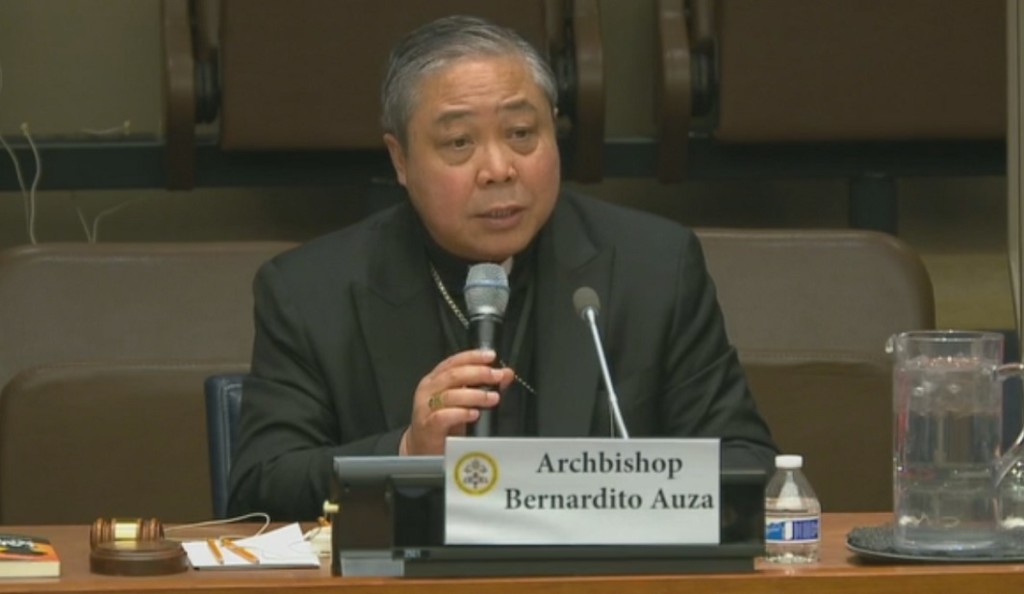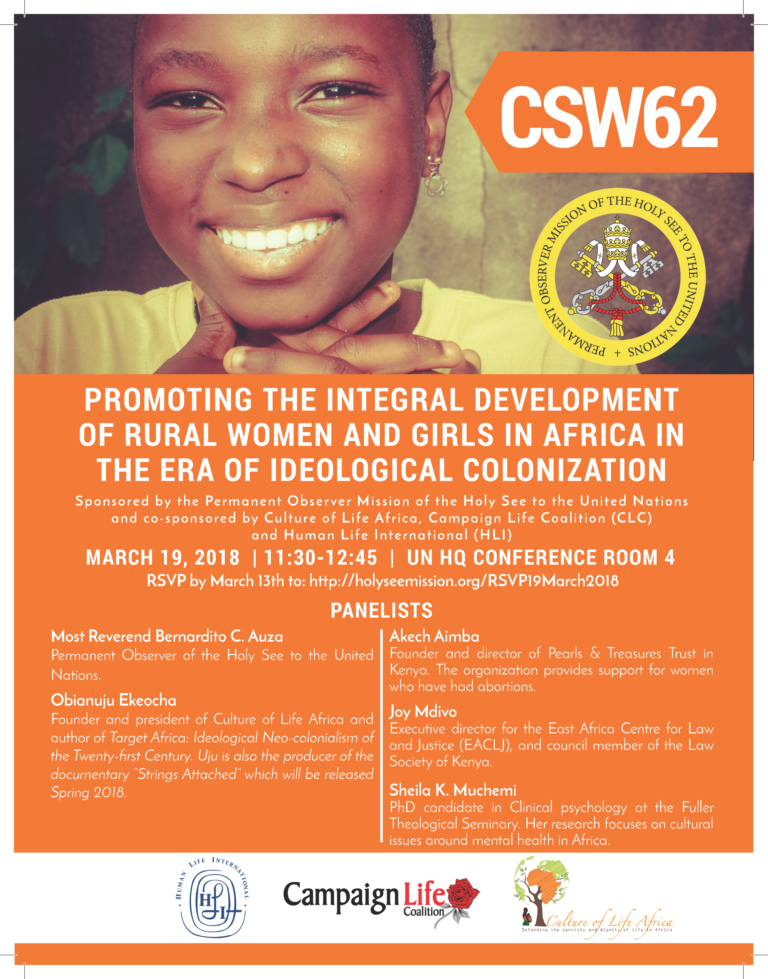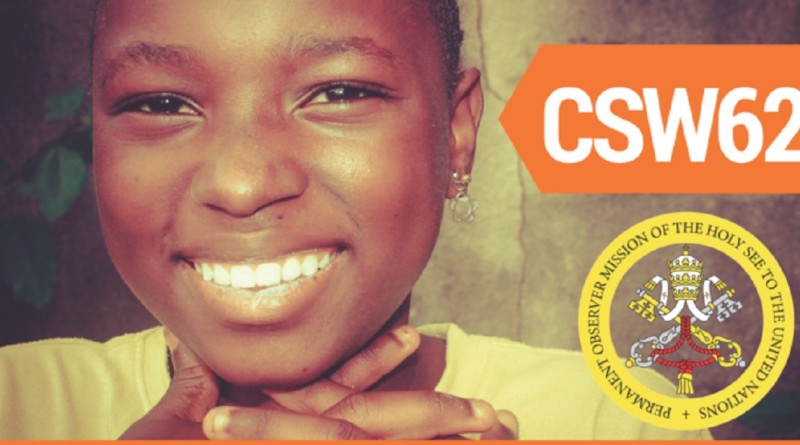Nazioni Unite: HLI insieme alla Santa Sede per sostenere le donne in Africa
Di Serenella Verduchi
“Promuovere lo sviluppo integrale delle donne e delle ragazze che vivono nelle campagne in Africa nell’epoca della colonizzazione ideologica” è questo il titolo dell’iniziativa che il 19 marzo scorso, la Santa Sede, insieme a Human Life International, Culture of Life Africa e Campaign Life Coalition, ha presentato presso le Nazioni Unite (il titolo originale è “Promoting the Integral Development of Rural Women and Girls in Africa in the Era of Ideological Colonization”).

L’evento che si è tenuto presso le Nazioni Unite, è stato organizzato volutamente in concomitanza della 62a sessione della Commissione dello status delle donne.
La conferenza ha voluto soprattutto evidenziare il problema della colonizzazione ideologica che spesso si vede mettere in atto sulle giovani donne, soprattutto in coloro che vivono nelle aree rurali, dove è più possibile trovare situazioni più vulnerabili. Questo incontro è stato un’occasione importante per ascoltare direttamente dalle donne africane: quali siano i loro veri bisogni e di come siano rimasti disattesi dalla comunità internazionale per lo sviluppo.
È possibile vedere il video dell’evento sul sito della web TV delle Nazioni Unite a questo link: webtv.un.org

Riportiamo qui di seguito il discorso, in lingua originale, che Sua Eccellenza Bernardito Auza, Osservatore Permanente della Santa Sede presso le Nazioni Unite, ha tenuto in questa occasione:
Promoting the Integral Development of Women and Girls in Africa
in the Era of Ideological Colonization
Archbishop Bernardito Auza
62nd Session of the Commission on the Status of Women
March 19, 2018 | UN Headquarters Conference Room 4
Your Excellencies,
Distinguished Speakers,
Delegates to the Commission on the Status of Women,
Dear Ladies and Gentlemen,
I would like to welcome you to this afternoon’s event on the theme of “Promoting the Integral Development of Rural Women and Girls in Africa in the Era of Ideological Colonization,” which the Permanent Observer Mission of the Holy See is co-sponsoring together with Culture of Life Africa, the Campaign Life Coalition and Human Life International.
When Pope Francis addressed the General Assembly of the United Nations in September 2015, speaking immediately before the adoption of the 2030 Agenda for Sustainable Development, he called attention to how the need for development can sometimes be used, he said, “as a cover for all kinds of abuse and corruption, or for carrying out an ideological colonization by the imposition of anomalous models and lifestyles that are alien to peoples’ identity.”
In the 30 months since that address, he has repeatedly returned to the subject of ideological colonization. This phrase describes the attempt of powerful and wealthy donors to compel developing countries that were once militarily and economically colonized to accept secularized practices with regard to human sexuality, life, family and even basic anthropology, as a condition for the reception of development assistance. Pope Francis has even called this type of development extortion tantamount to a “world war … not with weapons but with ideas.”
At the beginning of January, when he met in the Vatican with Ambassadors from across the world accredited to the Holy See, he discussed the 70th Anniversary of the Universal Declaration of Human Rights and sought to illustrate how in ideological colonization even reverence for human rights is being manipulated to try to advance new ideas and practices against the dignity and values of those in developing nations.
“Debatable notions of human rights,” the Pope said, “have been advanced that are at odds with the culture of many countries. The latter feel that they are not respected in their social and cultural traditions, and instead [are] neglected with regard to the real needs they have to face. Somewhat paradoxically, there is a risk that, in the very name of human rights, we will see the rise of modern forms of ideological colonization by the stronger and the wealthier, to the detriment of the poorer and the most vulnerable.”
Nowhere has this practice taken place more than in the developing parts of the continent of Africa, which receives more than 50 billion dollars of aid annually from Western donors. In the last 20 years, there has been a shift in foreign aid budgets from development aid for education, health, water supply, sanitation and other essential needs in favor of population control programs. The Organization for Economic Cooperation and Development’s recent analysis of Foreign Aid to Africa (2014) has demonstrated that more money is given for population control programs than for health, water supply, sanitation and education.
No one has detailed this phenomenon better than those who are enduring it. In 2015, the Catholic Bishops of Africa and Madagascar spoke out together in a Common Declaration about how some foreign governments are trying to impose their values on African peoples as a condition for receiving urgently needed health supplies, educational investments, other forms of development assistance and basic military help. Their language is strong and specific about how their human dignity and so many of the rights enshrined in the Universal Declaration are being bulldozed in order to receive the help needed to lift their peoples out of poverty.
“Selfish and perverse interests,” they write, “are imposing themselves on our continent with a speed that keeps on accelerating, with unabated aggressiveness, in an ever more organized and powerfully financed manner, introducing individualism and hedonism, both of which are so foreign to what we are and want to be, into our societies. This [is] a terrifying resurgence of a colonialist spirit under the guise of the appealing names of liberty, equality, rights, autonomy, democratization and development.
Condoms, contraceptives, sex education programs fabricated elsewhere, … so-called ‘safe abortions,’ have become commodities that are more accessible to Africans than the way of delivering integral development, of which we have such a vital need. It can no longer be denied that under the euphemism of ‘sexual and reproductive health and rights,’ such programs are plainly imposed as a condition for development assistance. Such is also the case of the so-called ‘gender perspective,’ according to which motherhood, the filial and nuptial identity of the human being and the family based on marriage between a man and a woman would be ‘discriminatory stereotypes.’”
This process of ideological colonization needs to be called out. The development system should never be used as a Trojan Horse to attack the cultural and religious values of developing nations. We would never intend to criticize development assistance, but when it becomes an instrument of imposition and control over poorer peoples’ and nations’ ways of life and values systems, we have to call it out.
Today’s event features four voices who will share with us their expertise and experience as to how this ideological colonization is affecting African women and girls, particularly in the vast rural areas of the continent. We will hear about what’s happening, how it is violating the deep, indigenous values of African women and girls, the suffering it is causing, and the constant legal battles and social divisions it is provoking. They are eager to share with us their experiences and perspectives.
Thank you for coming to listen to their testimony.
(Fonte : holyseemission.org )





